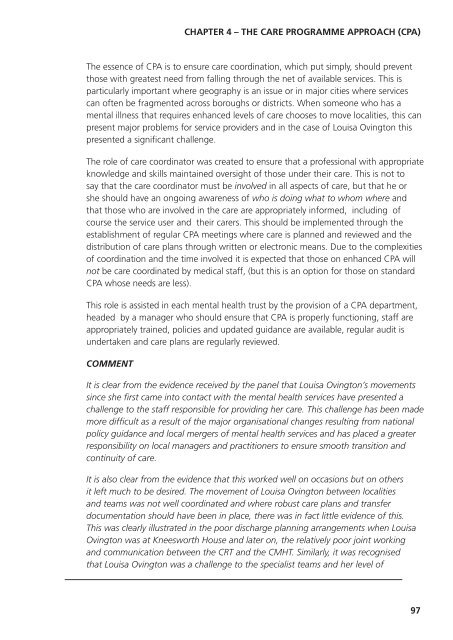Lousia Ovington independent investigation report ... - NHS North East
Lousia Ovington independent investigation report ... - NHS North East
Lousia Ovington independent investigation report ... - NHS North East
You also want an ePaper? Increase the reach of your titles
YUMPU automatically turns print PDFs into web optimized ePapers that Google loves.
The essence of CPA is to ensure care coordination, which put simply, should prevent<br />
those with greatest need from falling through the net of available services. This is<br />
particularly important where geography is an issue or in major cities where services<br />
can often be fragmented across boroughs or districts. When someone who has a<br />
mental illness that requires enhanced levels of care chooses to move localities, this can<br />
present major problems for service providers and in the case of Louisa <strong>Ovington</strong> this<br />
presented a significant challenge.<br />
The role of care coordinator was created to ensure that a professional with appropriate<br />
knowledge and skills maintained oversight of those under their care. This is not to<br />
say that the care coordinator must be involved in all aspects of care, but that he or<br />
she should have an ongoing awareness of who is doing what to whom where and<br />
that those who are involved in the care are appropriately informed, including of<br />
course the service user and their carers. This should be implemented through the<br />
establishment of regular CPA meetings where care is planned and reviewed and the<br />
distribution of care plans through written or electronic means. Due to the complexities<br />
of coordination and the time involved it is expected that those on enhanced CPA will<br />
not be care coordinated by medical staff, (but this is an option for those on standard<br />
CPA whose needs are less).<br />
This role is assisted in each mental health trust by the provision of a CPA department,<br />
headed by a manager who should ensure that CPA is properly functioning, staff are<br />
appropriately trained, policies and updated guidance are available, regular audit is<br />
undertaken and care plans are regularly reviewed.<br />
COMMENT<br />
CHAPTER 4 – THE CARE PROGRAMME APPROACH (CPA)<br />
It is clear from the evidence received by the panel that Louisa <strong>Ovington</strong>’s movements<br />
since she first came into contact with the mental health services have presented a<br />
challenge to the staff responsible for providing her care. This challenge has been made<br />
more difficult as a result of the major organisational changes resulting from national<br />
policy guidance and local mergers of mental health services and has placed a greater<br />
responsibility on local managers and practitioners to ensure smooth transition and<br />
continuity of care.<br />
It is also clear from the evidence that this worked well on occasions but on others<br />
it left much to be desired. The movement of Louisa <strong>Ovington</strong> between localities<br />
and teams was not well coordinated and where robust care plans and transfer<br />
documentation should have been in place, there was in fact little evidence of this.<br />
This was clearly illustrated in the poor discharge planning arrangements when Louisa<br />
<strong>Ovington</strong> was at Kneesworth House and later on, the relatively poor joint working<br />
and communication between the CRT and the CMHT. Similarly, it was recognised<br />
that Louisa <strong>Ovington</strong> was a challenge to the specialist teams and her level of<br />
97
















